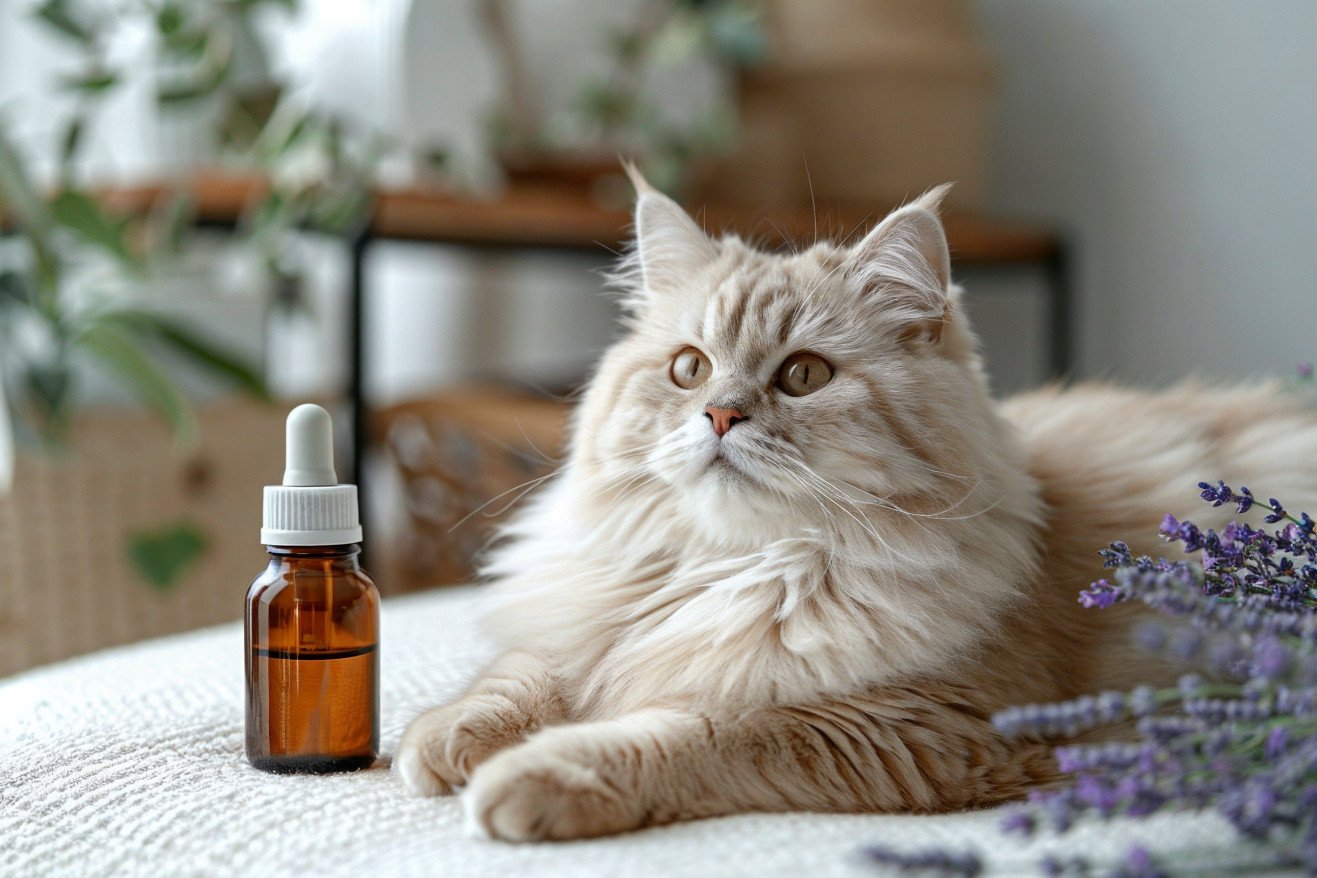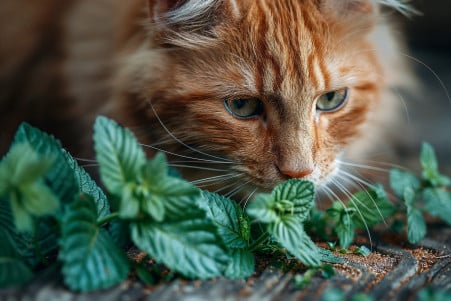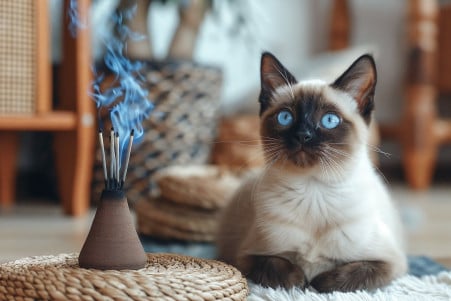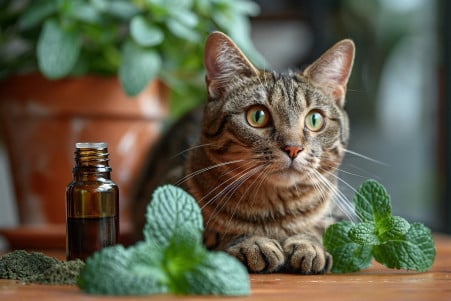Can Cats Smell Lavender? What Science Says
16 April 2024 • Updated 16 April 2024

Although humans find the smell of lavender to be pleasant, the way cats respond to the fragrant herb is a bit more complicated. Cats have an incredibly strong sense of smell, which is thought to be 14 times better than that of humans. While some cats may be indifferent or even attracted to the smell of lavender, many cats find the scent of lavender to be unpleasant and will avoid it.
This article will delve into the scientific research on feline biology and behavior to help you better understand whether or not cats can smell lavender. By learning about their sense of smell and natural behaviors, you'll be able to better understand how to create a living space that works for your cat. We'll also discuss the potential pros and cons of exposing cats to lavender so that you can make the best choices for your pet.
Can cats smell lavender?
The Risks: Lavender Toxicity in Cats
Lavender contains linalool and linalyl acetate, both of which are toxic to cats. While eating small amounts of the plant may only cause stomach upset, especially in sensitive cats, the risk is much greater with essential oils, which are highly concentrated. According to the ASPCA, both ingestion and inhalation of lavender essential oils can be harmful to cats.
Potential symptoms of lavender poisoning in cats include vomiting, lethargy, loss of appetite, respiratory issues such as wheezing and sneezing, skin irritation, and eye discharge or tearing. In more serious cases, lavender toxicity can lead to liver damage or central nervous system depression. Essential oils are more dangerous than the plant because they are more concentrated and the liver doesn't have the enzymes necessary to break down the volatile compounds.
The most dangerous form of exposure to cats is continuous exposure to high amounts of lavender oil. This is because the oil is easily absorbed through a cat's skin and respiratory system, which means it can be quickly absorbed into the bloodstream and liver, where it can cause chemical burns or liver damage. To ensure your cat's safety, it's important to limit their exposure to concentrated forms of lavender and watch for signs of toxicity.
Safe Alternatives: Exploring Natural Options for Calming Cats
While lavender may not be the safest option, there are various natural alternatives that can help calm and soothe cats. According to The Spruce Pets, herbs like valerian, chamomile, and catnip have been shown to have relaxing effects on felines. Supplements and products containing pheromones or flower essences can also help reduce stress and anxiety in cats, as noted by PetMD.
It's important to choose high-quality, pet-safe products and consult with a veterinarian for proper dosage and usage. As BeChewy highlights, herbs like chamomile and valerian can have a calming effect on cats, while essential oils should be avoided due to their potential toxicity. Exploring these natural alternatives can provide a safer way to create a calming environment for cats without the risks associated with lavender.
Safe Use: How to Safely Use Essential Oils Around Cats
Although some essential oils can be toxic to cats, some oils, such as lavender, may be safe to use in a diffuser if you use them in moderation and take the right precautions. Saje Wellness cites safety expert Robert Tisserand as saying that "you can diffuse essential oils around cats safely, so long as there's good ventilation, you only diffuse small amounts for limited periods of time, and your cat has the freedom to leave the room if it wants." He explains that "cats almost completely lack important liver enzymes that humans do possess, and which are important in the metabolism of many essential oil constituents."
In addition to using small amounts, diffusing for short periods of time, and making sure the room is well-ventilated, Daily Paws recommends not putting highly concentrated oils on cats and not using diffusers around cats with health issues. Some essential oils, including cedarwood, clary sage, and chamomile, are generally considered safe for use in a diffuser around cats.
It's important to watch your cat for any signs of a reaction and stop using the diffuser if you notice any negative effects. To ensure that you're using essential oils safely around your cat, it's important to talk to your vet and make sure you're following the recommendations of reputable sources. By taking the right steps, you can help ensure that you're using essential oils safely around your cat and that you're creating a safe and comfortable environment for your pet.
How to Identify and Treat Lavender Poisoning in Cats
It's also important to know how to identify and treat lavender poisoning in cats, as symptoms can vary in severity. The ASPCA lists some of the most common symptoms as vomiting, lethargy, respiratory distress, drooling, loss of appetite, and diarrhea. The Catster website adds that cats may also experience an irregular heart rate and rapid breathing.
If you suspect your cat has been exposed to lavender, it's important to take them to the vet immediately and not try to treat them at home. As the ASPCA explains, treatment will likely involve vomiting, supportive care, and monitoring for liver and neurological problems. Since there is no specific treatment for lavender poisoning in cats and severe cases can be fatal, it's important to focus on preventing exposure.
Knowing the signs of lavender poisoning and getting your cat to the vet as soon as possible can help ensure your cat stays safe and healthy. It will also be important to keep looking for natural remedies and maintaining a peaceful home to help support your cat's health.
Conclusion: How to Create a Safe and Happy Living Space for Your Feline Friends
While lavender has been shown to have a relaxing effect on people, the effects of lavender on cats are more complicated and less clear. This makes it especially important to understand a cat's biology and sense of smell when creating a healthy and happy living space for them. In general, it's best to avoid exposing cats to concentrated forms of lavender, such as essential oils, to prevent potential health problems.
However, there are natural options and safe ways to diffuse essential oils that can help cats feel more relaxed. For example, valerian, chamomile, and catnip have all been shown to have calming effects on cats, and products that contain pheromones or flower essences can also help cats feel less stressed and anxious.
That said, it's important to make sure that you're using high-quality, pet-safe products and to talk to your vet about the right dosages and methods. While cedarwood, clary sage, and chamomile are some of the essential oils that are considered safest to diffuse around cats, it's still important to take the right precautions.
In the end, the most important thing to keep in mind is the well-being of your cat and to be aware of their individual needs and preferences. By doing this and learning about the potential risks and alternatives, you can create an environment that helps support your cat's health and happiness.


